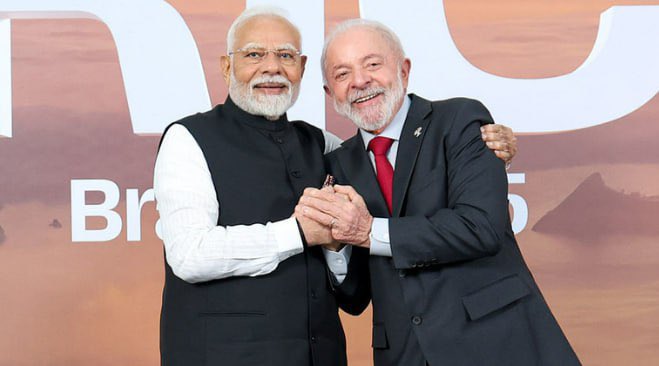Lula Rallies BRICS Leaders for UN Reform, Multilateralism, and Global South Solidarity
In a tightly coordinated virtual summit hosted under Brazil’s presidency of BRICS, President Luiz Inácio Lula da Silva convened leaders from across the bloc on Friday to push for bold reform of international institutions, deeper multilateral engagement, and expanded cooperation among Global South nations amid mounting global instability.
 |
| Image Source: RT_India |
The timing of the summit -- just weeks ahead of key global forums like the 80th United Nations General Assembly, COP-30 in Brazil, and the G20 Leaders’ Summit -- underscores BRICS’s growing ambition to play a more assertive role in shaping global governance.
A Reaffirmation of Institutional Reform
At the heart of the summit was a shared call to reform multilateral institutions — especially the United Nations and its Security Council — to reflect the evolving global power structure and address the persistent underrepresentation of Global South nations.
Leaders across the BRICS bloc reiterated that the current international system remains skewed in favor of a post-World War II order, and no longer mirrors today’s geopolitical realities.
Lula emphasized the urgency of democratizing global decision-making spaces to enable more inclusive, just, and effective responses to global challenges.
The joint assessment highlighted how growing economic disparities, political fragmentation, and unilateral sanctions have exacerbated instability worldwide -- impacting food security, energy supply, and global trade.
Pushback Against Unilateralism
The summit included focused discussions on the resurgence of unilateral trade measures and sanctions, seen as detrimental to emerging economies.
While no country was named explicitly, BRICS members have previously voiced concern over the use of tariffs, extraterritorial sanctions, and other non-transparent trade practices -- widely interpreted as criticism of the United States under President Donald Trump’s administration.
The group expressed consensus on the need to counteract these trends by expanding intra-BRICS trade, improving financial connectivity, and promoting a multipolar economic system built on mutual respect, rules-based practices, and fairness.
Global South Takes Center Stage
A consistent theme throughout the meeting was the empowerment of the Global South. From Africa to Latin America and Southeast Asia, BRICS leaders agreed that countries historically marginalized in global forums must now shape the future of international cooperation.
The inclusion of newer BRICS+ participants -- including Iran, Egypt, UAE, Ethiopia, and Indonesia -- reflects a strategic expansion of the bloc’s reach and legitimacy as a counterweight to the traditional G7-led order.
Leaders discussed how coordinated platforms like BRICS could bolster economic resilience, particularly through South-South cooperation, infrastructure partnerships, and climate-smart development financing.
Strategic Outlook Ahead of Global Summits
The summit served as a platform for informal coordination ahead of major diplomatic engagements this fall:
-
The 80th UN General Assembly (September 23, New York), where reform of multilateral bodies and sustainable development will dominate.
-
The COP-30 Climate Summit (November 6, Belém, Brazil), expected to spotlight climate finance, adaptation, and environmental justice for developing nations.
-
The G20 Leaders’ Summit (November 22–23), where Lula is expected to amplify BRICS and Global South priorities on global economic governance.
BRICS: From Dialogue to Action
While the BRICS bloc has often been criticized for being a discussion platform rather than a geopolitical force, recent developments point to greater cohesion.
Friday’s summit under Brazil’s leadership signaled clear intent to transition from rhetoric to implementation -- from joint statements to collective action.
By setting a unified tone on issues ranging from trade reform to security, BRICS is positioning itself as an anchor of multipolarity in an increasingly fragmented world.
Brazil’s presidency has laid out the groundwork. The question now is whether BRICS can sustain this momentum through coordinated policy execution and build a lasting architecture that delivers tangible results for the Global South.
